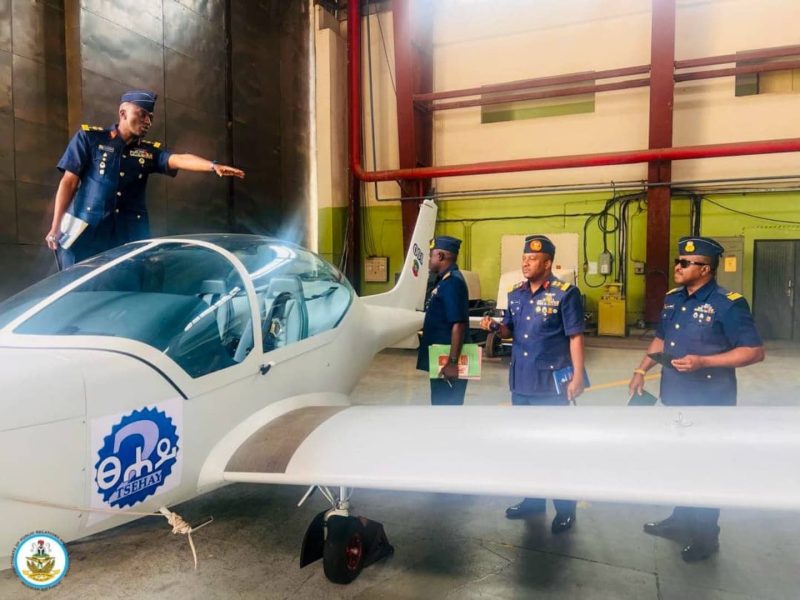In early July 2025, a delegation from the Nigerian Air Force (NAF) led by Air Commodore Ali Hussaini Idris set out for a three-day visit to the Ethiopian Air Force (FDRE AF) from July 1 to July 3.
The Nigerian team toured several major Ethiopian institutions, including the FDRE Air Force Headquarters, the Aviation Depot Maintenance Centre (ADMC), the Dejen Aviation Engineering Industry (DAVI), and the Air Force Academy. The timing of the visit coincided with preparations for Ethiopia on the 90th anniversary of military aviation. This is an event that reflects the country's longstanding history on the ground. The discussion during this visit will center around practical methods for enhancing technical cooperation.
One key area of focus was the proven ability to overhaul Ethiopian L-39 jets and MI series helicopters, a platform commonly used across the African Air Force for training and operational purposes. Beyond maintenance, the lecture explored wider collaboration opportunities, including exchanges of doctrinal knowledge and establishment of joint programs. These programs included training pilots and engineers, collaborative research efforts, and ambitious plans to jointly develop fully indigenous African unmanned aerial vehicles (UAVs).
To further strengthen this partnership, the NAF invited Ethiopian commanders to train at facilities in Nigeria, including the Air Worf Fair and Doctrine Centre and Air Walk College. Nigeria brings considerable experience to this collaboration, particularly in the area of UAV development. NAF has made notable advances in producing drones. This is evidence of the country's push to create domestic military equipment and reduce its dependence on foreign suppliers.
Among the results is the Tsaigumi UAV, one of the first drones developed by the Nigerian Air Force. This was followed by the creation of rifle armored hexacopters, a versatile platform designed for specific operational needs. Recently, Nigeria has introduced Damisa Attack Drone, a Kamikaze-style UAV built for combat missions, in partnership with Briech UAS. These advances demonstrate the growing expertise in Nigeria's unmanned systems, positioning it as a leader in the field among African countries. Meanwhile, Ethiopia is paving the path of drone technology with a focus on manufacturing. The country has established Skywin Air Nautic Industry, a state-run facility in Addis Ababa that is dedicated to producing drones for both civil and military purposes.

According to NTU Singapore, the facility is designed to manufacture a variety of unmanned systems, including intelligence, surveillance, defense and attack operations. The drones produced at Skywin are intended to target international markets while meeting Ethiopia's domestic needs, reflecting the country's ambitious vision for the aerospace industry. This investment in mass production complements Nigeria's operational experience and lays the foundation for a partnership that can combine the strengths of both countries. The idea of co-producing Indigenous African UAVs emerged as the center of discussion driven by the common goal of leveraging local capabilities to meet the security and technical needs of the continent.
Ethiopia is not used to drone technology. The country already operates a diverse UAV fleet from international suppliers, including Israeli Bluebird Aviation, China's CH-4 and Iran's Mohajere-6 models. These systems have played an important role in Ethiopia's defense strategy, particularly in addressing internal security challenges.
In 2022, the country's drone capabilities attracted attention when Getachew Reda, the leader of Tigray People's Liberation Front (TPLF), alleged that the United Arab Emirates was supporting Ethiopian troops with armed drones from Assab bases in Eritrea. While these claims highlighted the strategic importance of drones in regional conflicts, Ethiopia's new manufacturing initiative aims to turn the narrative into independence.
In Nigeria, this collaboration, with established track record in deploying homemade drones and Ethiopia's emerging manufacturing infrastructure, offers the opportunity to create UAVs tailored to African contexts. Such projects not only strengthen both countries' defense capabilities, but also demonstrate the possibility that African countries will cooperate with advanced technology initiatives. Hasan Bala Abubakar Air Force Chief Air Force staff, Chief of Nigerian Air Force Air Force, captured the broader vision behind the partnership, saying, “Such engagement underscores the NAF's unwavering commitment to strengthening in-Africa cooperation, promoting indigenous capacity and increasing operational effectiveness through strategic and comprehensive cooperation.” His words reflect the growing recognition that collaboration is key to unlocking the potential of aerospace in Africa.
By pooling resources, expertise and innovation, Nigeria and Ethiopia aim to build a foundation for self-sufficiency in defence technology beyond their dependence on external partners. This partnership will have an impact far beyond the immediate goals of UAV co-production. This represents a model of how African countries address shared challenges through cooperation and harness their strengths to achieve collective progress. For example, the exchange of training opportunities ensures that both Air Forces will improve their ability to learn from each other and run jointly in the future. Meanwhile, focusing on the development of indigenous diseases represents a shift towards solutions designed and produced within Africa, reducing the financial and logistical burden of importing foreign equipment.
The path forward requires both countries to navigate practical challenges, such as funding and adjustments to technical and industrial capabilities. However, the commitments presented during this visit, coupled with existing outcomes, suggest a strong foundation for success. If realized, African UAV co-production could encourage similar efforts across the continent, encouraging other countries to participate in joint ventures. Beyond military applications, the technologies developed through this partnership can be found in private sector applications such as agriculture and disaster management, amplifying their impact on Africa's development. The involvement between the Nigerian Air Force and the Ethiopian Air Force from July 1 to July 3, 2025 is more than a bilateral exchange, and is a statement of intent.
By working together to advance UAV technology, these two countries lay the foundation for a new era of aerospace innovation in Africa. Their efforts reflect a common belief that the future of the continent is in its ability to utilize its talent and resources, creating solutions that are not only practical, but also unique to Africans in their designs and purposes.


